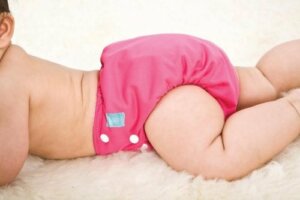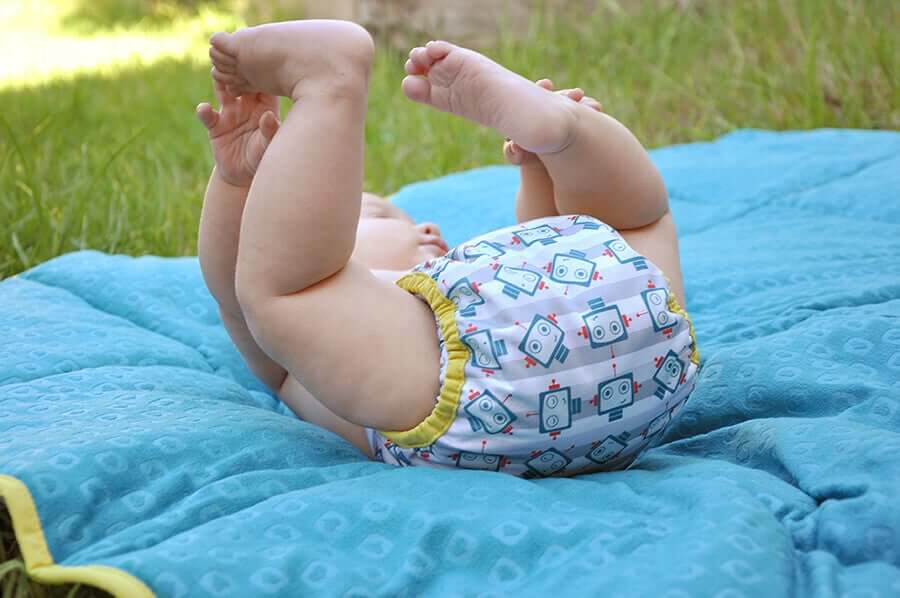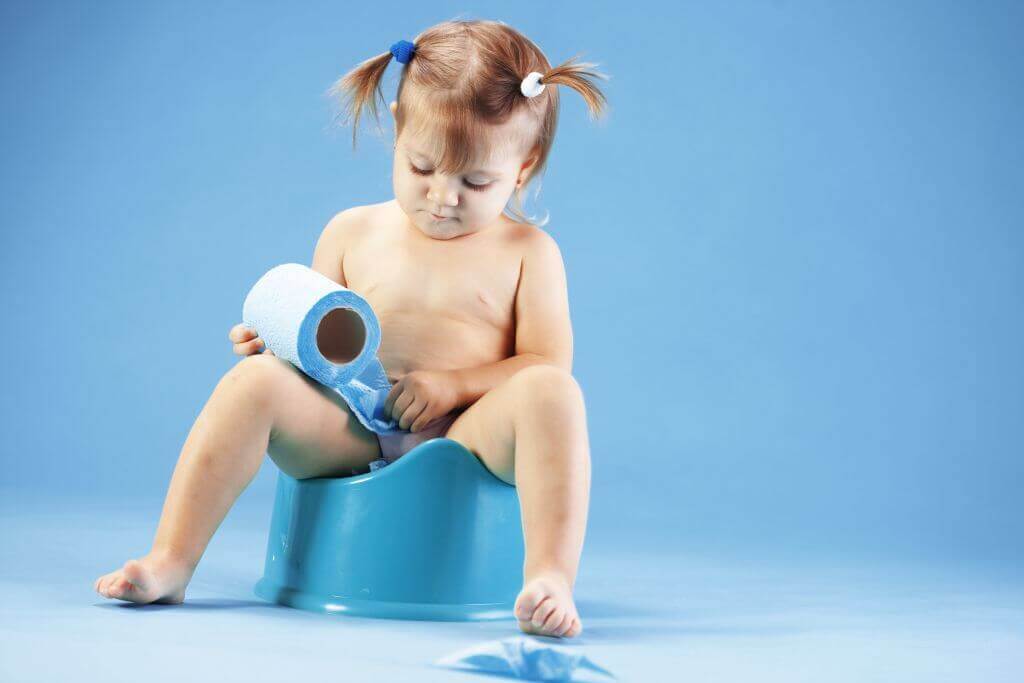When Is the Best Time to Stop Using Diapers?


Reviewed and approved by the psychopedagogue María José Roldán
One of the important steps in your child’s life is when they can go to the bathroom without help from anyone. At last, the days of diapering are over and they can tell when they want to go to the bathroom. This is a very important time for their development and parents should be prepared to know when is the best time to stop using diapers.
Wetting the bed is a common accident among young children who are still learning to use the toilet and to control their bowels. This learning process is transitory and slow in development, so it’s best to accompany babies with patience and gentleness. You never need to pressure them and you have to respect their own rhythm.
The reasons that lead parents to remove their baby’s diaper are very varied, but are usually external. Sometimes it occurs due to pressure from schools, where many times they don’t accept children who don’t know how to go to the bathroom alone. Or it may be due to pressure from third parties, who believe that the child is older and that they must learn to relieve themself without the help of a diaper.
These external factors shouldn’t condition you, as it’s essential that you respect your child’s own rhythm. If you don’t respect it, it’s more than likely that the child will have serious problems when it comes to learning to use the bathroom because they won’t feel safe or prepared to do so. Toilet learning should be a natural and not a forced process.

When is the best time to stop using diapers?
As we’ve mentioned above, this will depend on the child, although it usually occurs between 2 and 4 years old, depending on the maturation of the child. Remember that you’re not the one who decides whether or not your child should potty train. You must pay attention to the signals that your baby will give you little by little to warn you that they’re ready.
A study from Bristol-Myers Squibb Children’s Hospital in New Jersey stated that the ideal time is between 2 and 3 years of age. Although each child is unique and you must know your child to know when it’s the best time to stop using diapers.
There are those who think that children who stop using diapers after the age of 3 may have nocturnal enuresis, but this isn’t proven. The reasons for infantile or nocturnal enuresis can be varied and have nothing to do with when they learn to use the bathroom on their own.
It’s not at all a good idea for you to try to remove the diaper before the age of two, as your child is not at all prepared for the maturation process that comes with potty training and beginning to have more control of the bladder. Starting the process before the little one is ready will only make it take longer.
Ditching diapers: Signs that tell you they’re ready
Many dare to say that being ready to go to the bathroom depends more on physical and emotional factors than on a specific age. Ideally, it’s the child themself who decides when to quit; And the truth is that, in most cases where parents let the child decide when to stop using diapers, the change is less tragic than usual.

One day the child will start to complain about their diaper because it will make them hot or uncomfortable, or they’ll simply want to imitate what they see in adults as going to the bathroom and doing their business there. They might put the diaper back on for a while and maybe then take it off again, and so on, until they’re confident enough not to use it again.
If your child can already ask simple questions and can even understand them and follow basic instructions, you’re looking at a child who can already begin to learn to control their sphincters and warn you when the urge to relieve themself appears. This, as we’ve pointed out above, normally occurs in a range of 2 to 3 years of age.
Another sign that your child is able to toilet train is when they can pull up and down their pants or skirt without help. Sometimes those seconds are definite between getting on or off the toilet. At first, accidents are normal and you shouldn’t be angry if they occur, accompany your child and give them your emotional warmth.
Not all children function or learn things equally or at the same time. Some are more visual than others, some may learn more through their ears than through what they observe. It’s very diverse, and at that age, it’s difficult to know for sure… Observe your child in order to know what they need and when they can be ready.
However, that shouldn’t lead you to ignore the existence of your instincts, which will guide you toward the most appropriate and convenient way to toilet train. Therefore, don’t pressure them and give them your trust: Be patient and always show your unconditional love. In a calm and loving environment, learning is always more effective.
One of the important steps in your child’s life is when they can go to the bathroom without help from anyone. At last, the days of diapering are over and they can tell when they want to go to the bathroom. This is a very important time for their development and parents should be prepared to know when is the best time to stop using diapers.
Wetting the bed is a common accident among young children who are still learning to use the toilet and to control their bowels. This learning process is transitory and slow in development, so it’s best to accompany babies with patience and gentleness. You never need to pressure them and you have to respect their own rhythm.
The reasons that lead parents to remove their baby’s diaper are very varied, but are usually external. Sometimes it occurs due to pressure from schools, where many times they don’t accept children who don’t know how to go to the bathroom alone. Or it may be due to pressure from third parties, who believe that the child is older and that they must learn to relieve themself without the help of a diaper.
These external factors shouldn’t condition you, as it’s essential that you respect your child’s own rhythm. If you don’t respect it, it’s more than likely that the child will have serious problems when it comes to learning to use the bathroom because they won’t feel safe or prepared to do so. Toilet learning should be a natural and not a forced process.

When is the best time to stop using diapers?
As we’ve mentioned above, this will depend on the child, although it usually occurs between 2 and 4 years old, depending on the maturation of the child. Remember that you’re not the one who decides whether or not your child should potty train. You must pay attention to the signals that your baby will give you little by little to warn you that they’re ready.
A study from Bristol-Myers Squibb Children’s Hospital in New Jersey stated that the ideal time is between 2 and 3 years of age. Although each child is unique and you must know your child to know when it’s the best time to stop using diapers.
There are those who think that children who stop using diapers after the age of 3 may have nocturnal enuresis, but this isn’t proven. The reasons for infantile or nocturnal enuresis can be varied and have nothing to do with when they learn to use the bathroom on their own.
It’s not at all a good idea for you to try to remove the diaper before the age of two, as your child is not at all prepared for the maturation process that comes with potty training and beginning to have more control of the bladder. Starting the process before the little one is ready will only make it take longer.
Ditching diapers: Signs that tell you they’re ready
Many dare to say that being ready to go to the bathroom depends more on physical and emotional factors than on a specific age. Ideally, it’s the child themself who decides when to quit; And the truth is that, in most cases where parents let the child decide when to stop using diapers, the change is less tragic than usual.

One day the child will start to complain about their diaper because it will make them hot or uncomfortable, or they’ll simply want to imitate what they see in adults as going to the bathroom and doing their business there. They might put the diaper back on for a while and maybe then take it off again, and so on, until they’re confident enough not to use it again.
If your child can already ask simple questions and can even understand them and follow basic instructions, you’re looking at a child who can already begin to learn to control their sphincters and warn you when the urge to relieve themself appears. This, as we’ve pointed out above, normally occurs in a range of 2 to 3 years of age.
Another sign that your child is able to toilet train is when they can pull up and down their pants or skirt without help. Sometimes those seconds are definite between getting on or off the toilet. At first, accidents are normal and you shouldn’t be angry if they occur, accompany your child and give them your emotional warmth.
Not all children function or learn things equally or at the same time. Some are more visual than others, some may learn more through their ears than through what they observe. It’s very diverse, and at that age, it’s difficult to know for sure… Observe your child in order to know what they need and when they can be ready.
However, that shouldn’t lead you to ignore the existence of your instincts, which will guide you toward the most appropriate and convenient way to toilet train. Therefore, don’t pressure them and give them your trust: Be patient and always show your unconditional love. In a calm and loving environment, learning is always more effective.
This text is provided for informational purposes only and does not replace consultation with a professional. If in doubt, consult your specialist.








